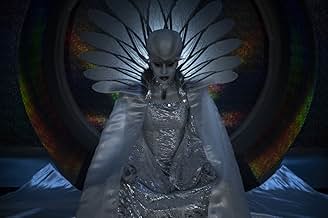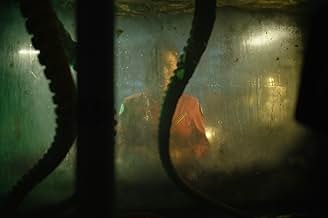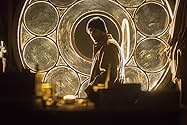Una versión actualizada de la clásica serie de televisión con varios cuentos de ciencia ficción, horror y misterio.Una versión actualizada de la clásica serie de televisión con varios cuentos de ciencia ficción, horror y misterio.Una versión actualizada de la clásica serie de televisión con varios cuentos de ciencia ficción, horror y misterio.
- Nominado para 1 premio Primetime Emmy
- 5 premios y 13 nominaciones en total
Explorar episodios
Argumento
¿Sabías que...?
- CuriosidadesAfter La dimensión desconocida (1959), Más allá de los límites de la realidad (1985) and Los límites de la realidad (2002), this is the fourth "Twilight Zone" television series. There have also been two films in the franchise: En los límites de la realidad (1983) and En los límites de la realidad: Los clásicos perdidos de Rod Sterling (1994).
- ConexionesFeatured in Half in the Bag: Us and Paddleton (2019)
Reseña destacada
The original Twilight Zone series was full of social commentary and messages that challenged society. With episodes touching on topics like racism, religion, censorship, greed, and corporatism, the show was far from a simple science fiction series. One might suggest the Twilight Zone started Hollywood's tradition of engaging in social and political issues.
So why did this concept work so well in the 1960s while receiving so much backlash today? The answer is simple: politics is more polarizing than it has been in recent history.
Rod Serling, the writer of the original series, set out to challenge viewers by creating content that neither the tv executives nor the regulators felt would make for a positive outcome, but they were wrong. It was a big success.
However, when revisiting old episodes, it's clear that Serling's radical approach to writing was still tame enough to appeal to most average American viewers of that era. Today, writing about social topics that make people uncomfortable while avoiding ideological backlash seems nearly impossible to do.
1964's episode "I Am the Night - Color Me Black" told the story of a town eager to hang an innocent black man after he was wrongfully convicted of killing a racist white man in self-defense. 2019's episode "Replay" tells the story of a woman using a rewind button on a camcorder to protect her son from a racist police trooper. Just read the other reviews and see how today's polarized viewer responds to the latter.
To be fair, many of the ideas conveyed by Serling's original Twilight Zone were deliberately written to not appeal to either side politically. The same probably cannot be said about this current reboot. It would be interesting to see if Serling could take on this challenge today.
Maybe the solution to this problem is to no longer use social commentary in writing. Or maybe the writers could make more obvious right leaning episodes to even things out. One thing is for certain, as long as entertainment seeks to talk about the things that make us uncomfortable, you'll manage to alienate a lot of viewers... here.... in The Twilight Zone.
So why did this concept work so well in the 1960s while receiving so much backlash today? The answer is simple: politics is more polarizing than it has been in recent history.
Rod Serling, the writer of the original series, set out to challenge viewers by creating content that neither the tv executives nor the regulators felt would make for a positive outcome, but they were wrong. It was a big success.
However, when revisiting old episodes, it's clear that Serling's radical approach to writing was still tame enough to appeal to most average American viewers of that era. Today, writing about social topics that make people uncomfortable while avoiding ideological backlash seems nearly impossible to do.
1964's episode "I Am the Night - Color Me Black" told the story of a town eager to hang an innocent black man after he was wrongfully convicted of killing a racist white man in self-defense. 2019's episode "Replay" tells the story of a woman using a rewind button on a camcorder to protect her son from a racist police trooper. Just read the other reviews and see how today's polarized viewer responds to the latter.
To be fair, many of the ideas conveyed by Serling's original Twilight Zone were deliberately written to not appeal to either side politically. The same probably cannot be said about this current reboot. It would be interesting to see if Serling could take on this challenge today.
Maybe the solution to this problem is to no longer use social commentary in writing. Or maybe the writers could make more obvious right leaning episodes to even things out. One thing is for certain, as long as entertainment seeks to talk about the things that make us uncomfortable, you'll manage to alienate a lot of viewers... here.... in The Twilight Zone.
- theendisopened
- 22 abr 2019
- Enlace permanente
Selecciones populares
Inicia sesión para calificar y añadir a tu lista para recibir recomendaciones personalizadas
- How many seasons does The Twilight Zone have?Con tecnología de Alexa
Detalles
Contribuir a esta página
Sugerir un cambio o añadir el contenido que falta

Principal laguna de datos
What was the official certification given to The Twilight Zone (2019) in Japan?
Responde








































